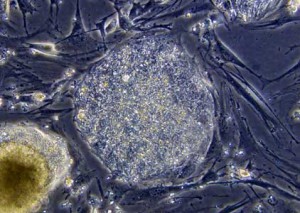Today’s Independent newspaper in Britain carries the front page news that stem cell research focusing on controversial human-animal hybrid cloning is grinding to a halt due to an unwillingness on the part of funding bodies to keep the research cash flowing.
 The UK passed legislation in 2008 allowing use of human-animal hybrid embryos for stem cell research in a controversial move that saw Prime Minister Gordon Brown and the country’s eminent scientists set against religious leaders and pro-life campaigners.
The UK passed legislation in 2008 allowing use of human-animal hybrid embryos for stem cell research in a controversial move that saw Prime Minister Gordon Brown and the country’s eminent scientists set against religious leaders and pro-life campaigners.
The UK has been a world-leader in stem-cell research and three groups had been allowed to pursue hybrid cloning research. Now two of them have been declined funding and may have to discontinue their work.
We all know scientists are constantly complaining about the level of funding available to them and the competitive nature of funding schemes (witness the grumbles here every time the Marsden Fund winners are announced).
But there appears, according to the Independent, to be a deliberate plan by scientists on the funding bodies to stem this type of research on “moral” grounds. Some scientists are obviously stunned – they see human-animal hybrid embryos being used to treat a whole range of diseases from Parkinson’s to Alzheimer’s.
As the Independent puts it: “Hybrid embryos – created by fusing human cells with animal eggs – could eventually allow doctors to create embryonic stem cells from a patient’s skin. This would the allow the development of personalised ‘body repair kits’ – where scientists could design individual treatments for heart disease, Parkinson’s and diabetes.”
The British Science Media Centre‘s Fiona Fox was clearly taken aback by the revelations.
“I find it remarkable given the unprecedented level of support for this research across the scientific community,” she told the Independent.
In an editorial on the subject, the Independent notes:
“For all the lobbying undertaken by the scientific community to prevent a ban, this may emerge as the effective result of the councils’ decisions.
“It is difficult be believe that there is no hybrid embryo researcher in Britain good enough to warrant a grant, so this episode prompts an obvious question of the tight-lipped funders: why have these scientists been turned down?”
So a major blow it seems for stem cell research in Britain just as President Bush’s exit from the White House looks set to allow this area of research to thrive in the US.
As the Economist points out in this week’s science editorial:
“It is also clear that lifting restrictions on embryonic-stem-cell research will be high on the agenda of the new administration. Democrats are already debating whether to overturn those restrictions through executive order or by legislation when they assume control of the government.”
There’s a huge amount of value in the US and the UK being on the same page in this area of research. While there may soon be the political will in the US to clear the path, if this type of research is effectively stymied by individuals in funding bodies, a valuable area of research is effectively dead in the water.
What’s the situation here? All we’ve really done in this area is talk, but as in the UK and the US, the political will is there.
“National has no plans to ban stem cell research in New Zealand. Funding of such research would be subject to normal application and approval criteria,” Prime Minister John Key told the Science Media Centre in the run up to the election.
That last bit, the “normal application and approval criteria” is where any research in this area is likely to get bogged down in the same issues the UK researchers are facing. Scientists here have been largely quiet on the stem cell research issue, which is not surprising given its controversial nature.
But all of that may be about to change. The Advisory Committee on Assisted Reproductive Technology, has advised the Minister of Health Tony Ryall to grant permission for the use of human embryos for stem cell research. The way has been paved for research in this area to take off. But pro-life campaigners are up in arms suggesting the issue will remain a hotly-debated one.
Right to Life New Zealand met news of ACART’s recommendation with this press release. A representative summed up the opposition case in bleak terms:
“The end does not justify the means. The destruction of human persons can never be justified to promote medical research. This is a culture of death.”